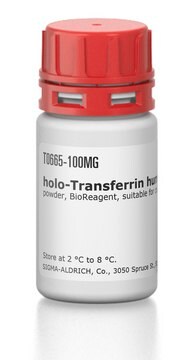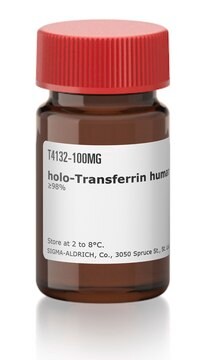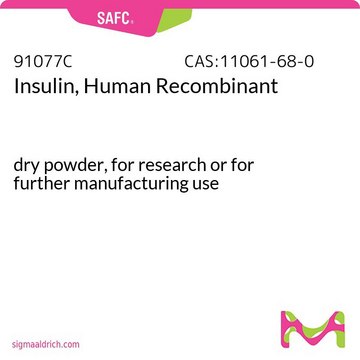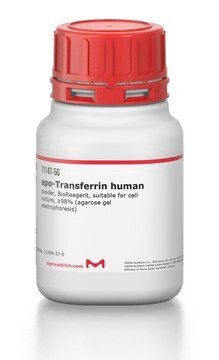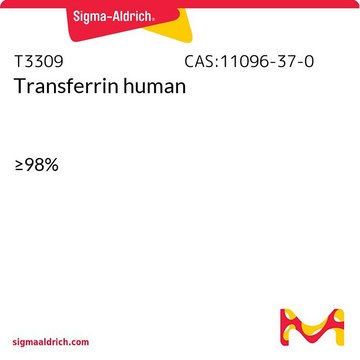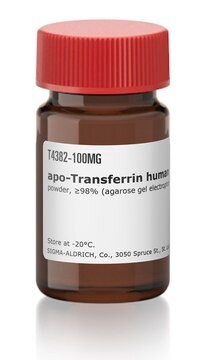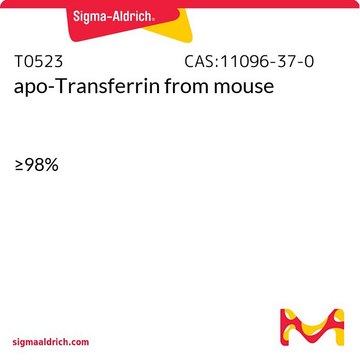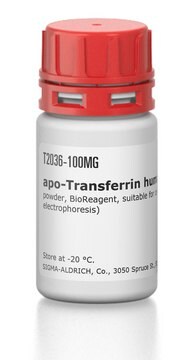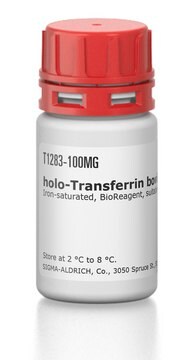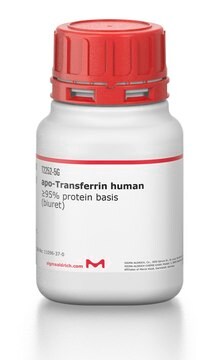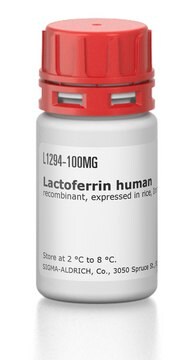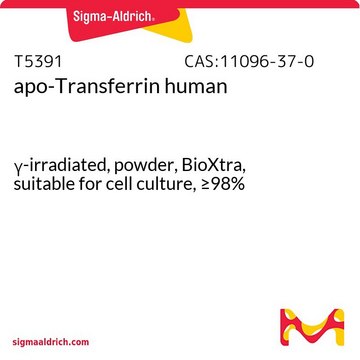SRP6512
Transferrin (HOLO) from human plasma
≥95% (SDS-PAGE)
Synonyme(s) :
DKFZp781D0156, PRO1557, PRO2086, Siderophilin, TF
Se connecterpour consulter vos tarifs contractuels et ceux de votre entreprise/organisme
About This Item
Code UNSPSC :
12352202
Nomenclature NACRES :
NA.32
Produits recommandés
Description générale
Transferrin is a monomeric glycoprotein found in plasma at an average concentration of 250 mg/100ml. Transferrin (TF) belongs to the family of bilobal glycoproteins which tightly bind ferric iron. Each of the homologous N- and C-lobes of the protein contains a single iron-binding site present in a deep cleft.
Application
Transferrin (HOLO) from human plasma has been used in flow cytometry.
Actions biochimiques/physiologiques
Transferrin (TF) serves as the iron transport protein in the blood. Iron is transported in the serum by binding to circulating transferrin, which in turn binds to receptors on the cell surface. Stored in bone marrow as TF-bound iron, it also possesses bacteriostatic and fungistatic activity. At the alkaline extracellular pH of 7.4, TF binds one or two ferric ions and two iron-bound TF molecules can bind the dimeric transferrin receptor (TfR). At this pH, iron-free transferrin is not recognized by TfR. This is followed by an endocytotic pathway involving the TfR, where the entire complex is internalized by endocytosis. When the pH is reduced in the cell, iron is released from TF leading to a conformational change in each lobe. Two critical lysines in the N-lobe of TF aid this conformational change allowing entry of a chelator to capture the iron. Finally, the complex gets back to the cell surface and the extracellular pH causes the dissociation of the apo-TF molecules from the receptor. Clinically, decreases in transferrin are observed in congenital disorders, newborns, inflammatory diseases, hypo-proteinemias and nephritic syndrome; increases are found in pregnancy, iron-deficiency anemias and inoculation hepatitis. Transferrin is required by all types of cells in cultures for maximal growth. It is, therefore, an important factor used in defined culture media.
Forme physique
Lyophilized from 20 mM Na phosphate, pH 7.4 and 150 mM NaCI.
Code de la classe de stockage
11 - Combustible Solids
Classe de danger pour l'eau (WGK)
WGK 3
Point d'éclair (°F)
Not applicable
Point d'éclair (°C)
Not applicable
Faites votre choix parmi les versions les plus récentes :
Certificats d'analyse (COA)
Lot/Batch Number
Vous ne trouvez pas la bonne version ?
Si vous avez besoin d'une version particulière, vous pouvez rechercher un certificat spécifique par le numéro de lot.
Déjà en possession de ce produit ?
Retrouvez la documentation relative aux produits que vous avez récemment achetés dans la Bibliothèque de documents.
Les clients ont également consulté
Transferrin receptor 1 is a cellular receptor for New World haemorrhagic fever arenaviruses
Sheli R
Nature (2007)
Peter J Halbrooks et al.
Biochemistry, 44(47), 15451-15460 (2005-11-23)
The transferrins (TF) are a family of bilobal glycoproteins that tightly bind ferric iron. Each of the homologous N- and C-lobes contains a single iron-binding site situated in a deep cleft. Human serum transferrin (hTF) serves as the iron transport
Yifan Cheng et al.
Cell, 116(4), 565-576 (2004-02-26)
Iron, insoluble as free Fe(3+) and toxic as free Fe(2+), is distributed through the body as Fe(3+) bound to transferrin (Tf) for delivery to cells by endocytosis of its complex with transferrin receptor (TfR). Although much is understood of the
Notre équipe de scientifiques dispose d'une expérience dans tous les secteurs de la recherche, notamment en sciences de la vie, science des matériaux, synthèse chimique, chromatographie, analyse et dans de nombreux autres domaines..
Contacter notre Service technique